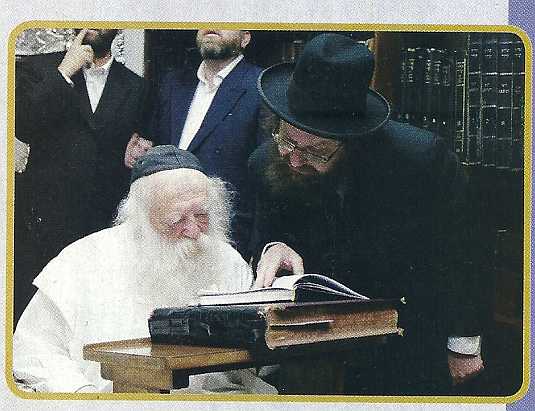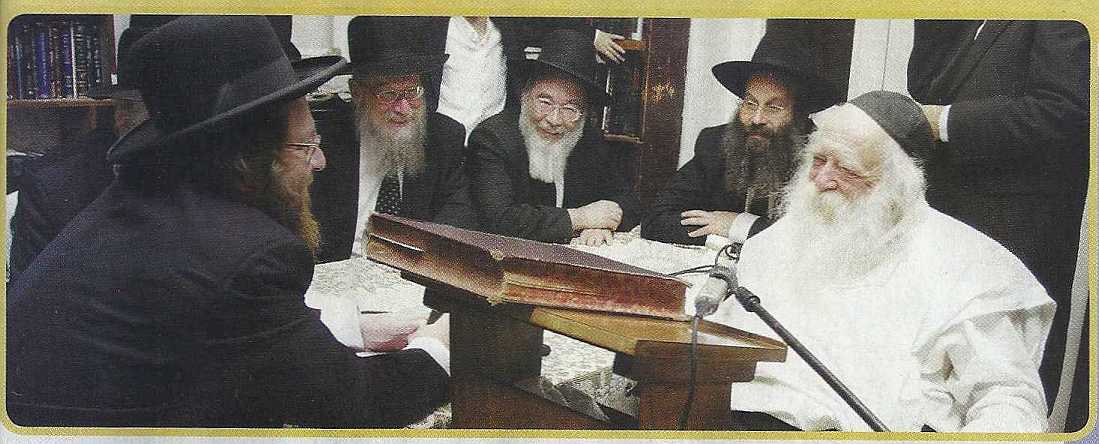A new sefer called Kol Mishalosecho has a wealth of answers to questions that were asked of HaRav Chaim Kanievsky shlita, with long answers to many of them. Here are a select few of the many stories and insights of the Sar Torah of our generation.
The new sefer

The Blessing to Rothschild - Wealth
I said to Maran that I once heard from HaRav Aharon Yehuda Leib Shteinman zt"l that HaRav Eliyahu Dessler zt"l once attended the wedding of a relative of his confidante and said: "As someone close to you, I would like to bless you from the depths of my heart that you never be tried with riches."
One scholar rose and said, "Why not? On the contrary, let him be a gvir."
HaRav Chaim Kanievsky reacted: "HaRav Dessler gave him a good blessing. The Amoraim in the gemara (Horayos 10b) differed. R' Nachman son of R' Chisda ... and Rovo said: If the tzadikim eat of Two Worlds is that bad for them? Rovo himself was wealthy, as we know from Chagigah (5b). Rovo concludes that fortunate are those tzaddikim who get the usual lot of the wicked in this world, in this world. By the usual lot of the wicked, is meant riches." [Since it is normal for the wicked to be rich in this world so that they will get the reward for their good deeds in this world.]
I [meaning the author of this book] said: HaRav Dessler asked a good question: Is it not a wonder that Baron Rothschild was given a blessing of wealth for his whole life? What kind of a blessing is that seeing that today all of his descendants are goyim?
I heard that the story went as follows: The Chacham Tzvi once stayed at Rothschild's home for an extended period. The Chacham Tzvi was very meticulous in his practices and complained about certain things. Rothschild's wife took affront but he calmed her. One time, it was already too much to bear and Rothschild said to Chacham Tzvi: "If you find it difficult to remain here, you are free to go elsewhere."

R' Chaim with the author of the sefer
The Chacham Tzvi replied: I am shortly expecting a writ of Rabbonus and will be leaving. If you had waited another day, I would have blessed you and your descendants (both spiritually and materially) but now all I will just bless you and your descendants that they be rich.
If one knows how to preserve the positive aspects of wealth, one may derive tremendous benefit from it, which is why he only received specifically this blessing (which has the condition and difficulty of knowing how to deal with it, which is not easy). Had he waited one more day, he would have gained the full blessing.
I said: I heard from HaRav Mordechai Rabinowitz who told over in the name of his grandfather, HaRav Yaakov Neiman: If I had the rabbinical authority, I would have added in the morning blessings, "... Who did not make me a gvir."
Maran's response was: This is incorporated in the blessing of "...that He did not make a goy" because this also includes non-Jewish practices by Jews, and indeed, many Jewish tycoons have smatterings of goyishkeit.
It Was Fortunate That He Lost His Money
Someone asks: His father-in-law was a very wealthy man in Europe but always flaunted his charitable donations in public, showing no humility and modesty therein. And then, he lost most of his money. Some time later, he himself, also a rich man, was asked to be the guest of honor at a dinner but he emphatically refused because of the publicity. Askonim pressured him and convinced him that precisely the publicity would be very advantageous to their cause, and he capitulated. Not long after, he, too, lost most of his wealth.
This is a fortunate thing for him because wealth leads to pride.

R' Chaim with HaRav Sholom Ber Sorotzkin, HaRav Tzvi Eliach, HaRav Boruch Shapira
Upon one occasion, I told Maran that a certain gvir was prepared to give a large sum to a yeshiva on condition that when he entered the yeshiva hall, everyone clap their hands for five whole minutes. Was this permissible?
He deserved to be sent to a mental hospital. This is forbidden and is, in fact, a disgrace to the Torah.
I remarked about that gvir from the Mirrer Yeshiva that Chazal say that poverty drives a person against his own better judgment and also distances him from his Creator, but ofttimes, this also applies to riches.
The response was: Riches even more so.
I again asked HaRav Shteinman about the matter with Yeshivas Mir and he said: It is a travesty to Hashem. The Rema writes that if one gives to charity in order to receive honor, he is punished. And if one accepts money on this basis, he deserves punishment because it is a chillul Hashem. As for the aforementioned European magnate, he noted: In "Shaarei Rachamim" it states that Hashem sometimes grants this blessing to a person so that when He removes it, he will find atonement. It is possible that his merit in giving tzedaka helped him that he find atonement through the wealth being taken away because perhaps an evil decree had been passed against him and this was annulled by his becoming impoverished.




